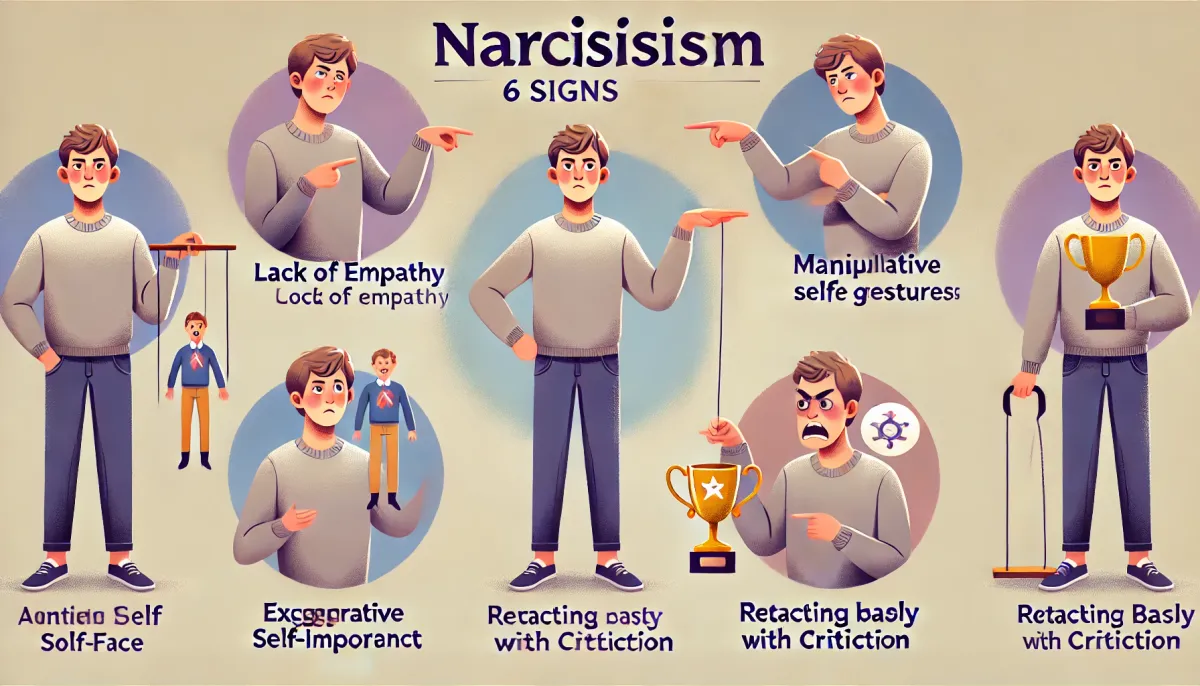6 Signs You're Dealing with a Narcissist in Your Life
Learn how to spot the six clear signs of narcissism, from lack of empathy to manipulative behavior, and protect yourself from toxic relationships.

Dealing with a narcissist can be confusing, exhausting, and emotionally draining. Narcissists are skilled at manipulating others, making it difficult to recognize their behaviour until you’re deeply entangled. Whether it’s a friend, family member, colleague, or partner, understanding the traits of a narcissist can help you protect yourself from their damaging influence. Here are six amazingly clear signs you're dealing with a narcissist in your life.
1. They Lack Empathy
The Absence of Emotional Connection
One of the hallmark traits of a narcissist is their inability to empathize with others. Narcissists are often so focused on their own needs, desires, and feelings that they show little or no concern for what others are going through. This lack of empathy means they struggle to understand or care about how their actions impact those around them.
- What it looks like: They may dismiss your emotions, downplay your problems, or show indifference to your feelings, even in situations where most people would be compassionate or supportive.
How to Detect It
If someone in your life consistently brushes off your emotions or is unable to offer support during difficult times, this could be a clear sign of narcissistic behavior. Genuine relationships require empathy and understanding—without these, a relationship can become one-sided and toxic.
2. They Constantly Seek Attention
The Need to Be the Center of Everything
Narcissists crave attention and admiration. They love being in the spotlight and will do whatever it takes to stay there. Whether through boasting, creating drama, or turning every conversation back to themselves, narcissists need constant validation to feed their inflated ego.
- What it looks like: They dominate conversations, constantly talk about themselves, and often interrupt or change the topic if the focus shifts away from them. Even in group settings, they will find ways to make everything about them.
How to Detect It
Notice how they behave in social situations. Do they constantly try to outshine others or make themselves the centre of attention? If they can’t handle the spotlight being on someone else, this could be a clear indication you’re dealing with a narcissist.
3. They Have a Grandiose Sense of Self-Importance
The "I'm Better Than Everyone" Attitude
Narcissists believe they are superior to others. They have an exaggerated sense of self-importance and feel entitled to special treatment, often without any real accomplishments to back up their grandiosity. They may brag about their achievements, downplay others' successes, and expect admiration from everyone around them.
- What it looks like: They often talk about how amazing they are, exaggerating their talents and achievements. They may act like the rules don’t apply to them and expect others to treat them as special.
How to Detect It
If someone you know frequently talks about how much better they are than others, constantly seeks praise, or acts entitled, you’re likely dealing with a narcissist. Their inflated sense of self-importance can be exhausting to those around them.
4. They Gaslight You
Manipulating Reality
Gaslighting is a common tactic used by narcissists to manipulate and control others. It involves making you question your own memory, perception, or reality. Narcissists will twist the truth, deny things they’ve said or done, and make you feel like you're imagining things. This psychological manipulation leaves you feeling confused and doubting yourself.
- What it looks like: They may deny ever making hurtful comments or insist that you’re overreacting to their behavior. They twist situations to make you feel like you're the problem, even when they’re clearly in the wrong.
How to Detect It
If you frequently feel confused or start doubting your own perceptions after interactions with someone, gaslighting may be at play. Pay attention to whether they deny facts, twist your words, or blame you for things you know aren’t your fault.
5. They Exploit Others Without Guilt or Shame
Using Others for Personal Gain
Narcissists are experts at exploiting others to meet their own needs. Whether it’s taking advantage of someone’s kindness, using people for favors, or manipulating others to get ahead, they have no problem stepping on others to achieve their goals. They lack guilt or remorse for how their actions affect those around them.
- What it looks like: They might take credit for other people’s work, manipulate you into doing things for them, or use charm to get what they want without offering anything in return.
How to Detect It
If you notice a pattern of someone constantly using others for their own gain, never giving back, or feeling no guilt about taking advantage of others, this is a strong sign of narcissism. Narcissists see people as tools to be used, not as individuals with their own needs.
6. They React Badly to Criticism
Fragile Egos Beneath the Surface
Despite their outward confidence, narcissists have extremely fragile egos. They can’t handle criticism, no matter how constructive or well-intended. If they feel their superiority is being challenged, they often react with anger, defensiveness, or even a full-blown tantrum. This overreaction to any perceived slight is known as “narcissistic injury.”
- What it looks like: When confronted with criticism, they might lash out, blame others, or attempt to undermine the person giving feedback. They may also sulk, withdraw, or become passive-aggressive.
How to Detect It
If someone in your life reacts with extreme defensiveness or hostility to even the mildest criticism, it’s a clear red flag. Narcissists can’t tolerate anything that threatens their inflated self-image.
Conclusion: Protect Yourself from Narcissistic Behaviour
Recognizing these six signs of narcissism can help you protect yourself from toxic relationships and emotional manipulation. Narcissists are often skilled at hiding their true selves, especially early on in relationships, but once you know what to look for, their behaviours become easier to spot. If you suspect someone in your life is a narcissist, setting firm boundaries and seeking support is crucial to maintaining your emotional well-being.
Remember, while it’s not always possible to avoid narcissists, you can protect yourself by staying aware, trusting your instincts, and refusing to let their manipulative tactics control your life.
You May Like :
- The Dark Side of Success: How Ambition Can Lead to Moral Compromise
- How Dark Psychology Manipulates and How You Can Protect Yourself
- Dark Psychology Tactics of Influence and Control
- Psychology Behind Lying and How to Spot It
- How Dark Psychology Can Sabotage Relationships and Ways to Break Free
- The Shadow of Guilt: How It Haunts Our Subconscious
- The Psychology of Envy: How Jealousy Shapes Our Thoughts and Actions
- Dealing with Social Rejection: 7 Strategies to Overcome It
- Divorce Red Flags: Signs Your Marriage Might Be Heading for Trouble
- How to Improve Your Emotional Intelligence for Better Relationships and Success
- 10 Surprising Ways Stress Affects Your Mind and Body—and How to Fight Back!
- The Power of Habits: How to Build Positive Routines and Break Bad Ones
- Understanding Anxiety: Causes, Symptoms, and Effective Coping Strategies
- 10 Mind-Blowing Facts About Social Psychology You Need to Know
- How to Spot Fake Nice People: Key Signs and Red Flags to Watch Fors
Valid Laws is a reader-supported publication. To receive new posts and support my work, consider becoming a free or paid subscriber.
Thanks for reading Valid Laws! This post is public so feel free to share it.



